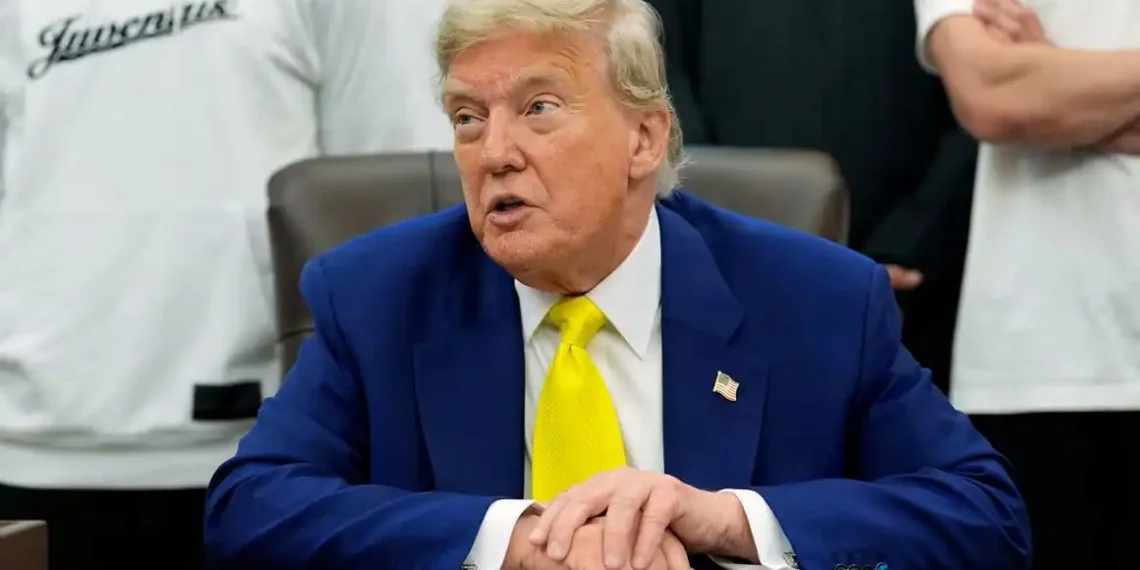Trump Weighs Iran Strike but Warns: “I’m Not Looking for a Long War”
As tensions between Israel and Iran escalate, former President Donald Trump faces one of the most consequential decisions of his post-presidency: whether to involve the U.S. military in strikes on Iranian nuclear facilities.
Sources close to the matter say Trump is walking a fine line. While he’s open to helping Israel hit hard — possibly with bunker-busting bombs targeting Iran’s underground nuclear sites — he’s just as determined to avoid plunging the United States into a drawn-out war.
“I like to make the final decision one second before it’s due,” Trump said from the Oval Office. “Especially with war, things change. It can go from one extreme to the other.”
A Reluctant Warrior?
Trump’s inner circle — including national security officials and foreign policy aides — have been weighing options for targeted U.S. military action. One model they keep revisiting: Trump’s 2020 drone strike that killed Iranian General Qasem Soleimani. It was a serious blow to Iran but, in the administration’s view, did not lead to all-out war.
The goal this time, they argue, would be similar: a decisive, limited strike that degrades Iran’s nuclear capacity without dragging the U.S. into a regional conflict.
David Friedman, Trump’s former ambassador to Israel, downplayed the risks of escalation on social media:
“America might just drop a few MOABs on Fordow, destroy the last nuclear asset, and then leave. The air space already is clear. How is that being dragged into anything?”
Still, sources say Trump hasn’t made a final decision — and he’s in no rush. Over the weekend, his administration signaled to U.S. allies that it would wait to see what Israel could achieve on its own before committing American firepower.
Risks on All Sides
While Israel pushes for U.S. help, allies are urging caution. European diplomats and American lawmakers alike fear the fallout of U.S. strikes — from Iranian retaliation to a potential blockade of the oil-rich Strait of Hormuz.
Iran’s Deputy Foreign Minister Majid Takht-Ravanchi made Tehran’s warning crystal clear:
“If the Americans decide to get involved militarily, we have no choice but to retaliate wherever we find the targets necessary to be acted upon… That is clear and simple.”
There’s also concern that U.S. action could accelerate Iran’s nuclear ambitions, not stop them. Intelligence officials have warned that Iran may see any strike as justification to build a weapon outright.
Behind Closed Doors: Camp David and Quiet Strategy Talks
In the days before Israel launched its latest attack, Trump held an impromptu intelligence briefing at Camp David. CIA Director John Ratcliffe, along with Director of National Intelligence Tulsi Gabbard, rushed to join after learning that Israeli action was imminent.
Ratcliffe updated Trump on Iran’s nuclear program and warned of possible next moves. Sources say the session, while hastily arranged, shaped much of Trump’s current thinking — and kept military leaders like Gen. Michael Kurilla, head of U.S. Central Command, on high alert.
Kurilla, a longtime supporter of Israel, has reportedly pushed for more U.S. assets to be deployed to the Middle East. He wants to ensure readiness if things spiral — especially in case Iran’s regional proxies like the Houthis or Hezbollah get involved.
Divisions in Trump’s Circle and on Capitol Hill
Inside Trump’s camp, opinions are split. Some see surgical strikes as a show of strength without long-term entanglement. Others warn that there’s no such thing as a “quick” war with Iran.
Sen. Jim Risch (R-Idaho), chairman of the Senate Foreign Relations Committee, has praised Trump’s restraint so far:
“I think he has done a masterful job of threading a very, very difficult needle.”
But not everyone is convinced. Sen. Josh Hawley (R-Missouri) expressed strong reservations:
“I don’t want us fighting a war. I don’t want another Mideast war. I’m a little concerned about our sudden military buildup in the region.”
Meanwhile, the Pentagon has quietly begun preparing for possible Iranian retaliation, even before Trump gives a green light.
One Goal, One Red Line
Despite the strategic back-and-forth, Trump insists his end goal remains clear:
“I only want one thing: Iran cannot have a nuclear weapon,” he said Wednesday.
“That’s it. I’m not looking long term, short term. And I’ve been saying that for 20 years.”
Whether he can achieve that without igniting a wider war is the billion-dollar question — one the world is now waiting for him to answer.
This article was rewritten by JournosNews.com based on verified reporting from trusted sources. The content has been independently reviewed, fact-checked, and edited for accuracy, neutrality, tone, and global readability in accordance with Google News and AdSense standards.
All opinions, quotes, or statements from contributors, experts, or sourced organizations do not necessarily reflect the views of JournosNews.com. JournosNews.com maintains full editorial independence from any external funders, sponsors, or organizations.
Stay informed with JournosNews.com — your trusted source for verified global reporting and in-depth analysis. Follow us on Google News, BlueSky, and X for real-time updates.














